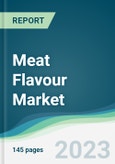The global meat flavour market is expected to grow at a CAGR of 5.74% from a market size of US$2.184 billion in 2021 to reach US$3.228 billion in 2028.
Meat flavors are additives and compounds added to products such as noodles, ready-to-eat meals, snacks, and precooked or roasted meat to give out the umami taste and odour of meat. Hydrocarbons, aldehydes, glutamate, ketones, alcohols, guanylate, furans, thiophenes, inosinate, pyrrols, pyridines, and pyrazines are among the many flavour compounds present in meat.Meat products come in various flavours, such as barbeque, grilled, nutty, and smoked, to cater to consumers' growing demand for exotic flavours. Due to the growing demand for complex, bold, nuanced, and enhanced flavours, innovations and experiments to develop new meat flavours are driving the global meat flavour market during the projection period. Rising consumer differences towards vegan and vegetarian diets have also led to a burgeoning demand for meat flavours. Since vegan and vegetarian consumers cannot consume meats and their products, they are looking for alternative meat products that taste exactly like beef, roasted chicken, or pork.
According to the Japanese flavour and fragrance company T Hasegawa, the food service industry remains the dominant distribution channel for many meat flavours. Still, it may be a sign of the times that retailers and brands may close the gap, particularly in prepared items. Therefore, the booming HoReCa industry is contributing to the growth of the global meat flavours market.
However, complex laws, restrictions, possible side effects to meat products, and high & volatile prices of raw materials obstruct the growth of the global market for meat flavours during the analysis period. Moreover, continuous innovative and novel flavour launches, such as Latin flavours and cereal-like flavours, provide new opportunities to market participants during the forecast period.
The growing demand for complex and enhanced flavour profiles is contributing to the global meat flavours market.
Value-added meats and meat analogs with marinades, rubs, and spices provide convenience and adaptability while shaping the whole dining experience. Brands can appeal to authentic local preferences as emerging flavours establish local and global roots. Complex meat flavour profiles with a mix of heat and sweetness, smokey overtones, and botanicals are gaining popularity. Exploration into lighter flavour families with links to freshness and wellness, such as citrus, herbal, and floral, is making minor progress. Chef recipes, crisp textures, and novel ingredients liven up meat alternatives, while smoky flavours and other natural plant-based elements mimic the fragrance and taste of cooked meat and fish.According to the latest trends report published by Japanese flavour company T Hasegawa shows that 57 percent of consumers are looking for unique flavours to make their meat more interesting. 49 percent of consumers say flavour is an important attribute when purchasing proteins. Some examples of trendy flavours for meat and meat alternative include Fajita, Cajun, Jalapeño, Chipotle, Rosemary, and Salsa Verde.
North America is anticipated to hold a significant share of the global meat flavours market during the forecast period.
North American region is anticipated to hold a significant market share in meat flavours. This region will experience rapid expansion throughout the projection period due to high meat-consuming pollution in countries such as the US. Meat is part of 77 percent of American adult diets. Meat and meat alternative flavours are in high demand in markets such as the United States and Canada. In the United States, the most popular meat flavour profile is barbecue. Around 68 percent of US consumers prefer barbeque flavour in their meat products. This region's market is also expanding due to the growing vegan and vegetarian population. This region's market is expanding due to changing eating habits and rising demand for healthy, ethnic, and exotic flavoured meat products. In addition, the prevalence of key market players such as Givadudan, IFF, and Firmenich also spurs the growth of meat flavours in this region. Prime markets in the North American region are the United States, Canada, and Mexico.Market Developments:
- In February 2023, Mush Foods, an Israeli food startup, launched a 50CUT mycelium protein ingredient solution to slash the animal protein content in meat products by 50 percent. Mushroom-derived 50CUT provides a beefy bite of nutrient-dense protein-to-meat hybrid formulations that appeal to even the most devoted meat consumers.
- In December 2022, Black Sheep Foods, an American food start-up headquartered in San Francisco, got an investment of US$ 18.5 million to bring new and innovative flavours for plant-based meat products.
- In July 2022, American-based chicken sausage company Amulya launched four new flavours under its Sausages by Amylu brand, available in select Whole Foods Market locations. The latest flavour innovations include Cacio e Pepe, Roasted Garlic & Asiago; Tomatillo, Peppers & White Cheddar; and Artichoke Leek & Gruyere.
Market Segmentation:
By Type
- Natural Meat Flavor
- Artificial Meat Flavor
By Flavour Type
- Beef
- Chicken
- Pork
- Turkey
- Fish & Seafood
- Others
By Application
- Soups & Sauces
- Instant Noodles
- Ready Meals
- Savories
- Baked Goods
- Others
By Geography
- North America
- United States
- Canada
- Mexico
- South America
- Brazil
- Argentina
- Others
- Europe
- United Kingdom
- Germany
- France
- Spain
- Others
- Middle East and Africa
- Saudi Arabia
- UAE
- Israel
- Others
- Asia Pacific
- Japan
- China
- India
- South Korea
- Indonesia
- Thailand
- Others
Table of Contents
Companies Mentioned
- Firmenich SA
- Kerry Group plc
- DSM N.V.
- International Flavors & Fragrances Inc.
- Sensient Technologies Corporation
- Givaudan
- Symrise AG
- Synergy Flavors
- T. Hasegawa
- Mane Flavours and Fragrances Manufacturers








